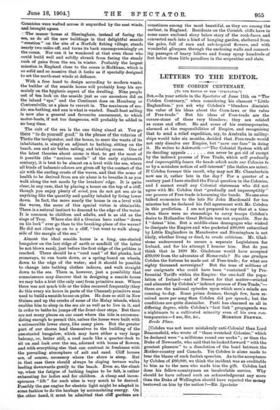LETTERS TO THE EDITOR.
THE COBDEN CENTENARY.
LTo VIE EDITOR OP TUE 'SPECTATOR."]
Sin,—In your article in the Spectator of June 11th on "The Cobden Centenary," when considering his clamant "Little Englandism," you ask why Cobden's "blunders diminish the value of his ideas about the Corn-laws or the value of Free-trade." But his ideas of Free-trade are the corner-stone of these very blunders ; they are related as cause and effect. He and some of his contemporaries, alarmed at the responsibilities of Empire, and recognising that to send a relief expedition, say, to Australia in sailing. ships would take six months, decided that Free-trade would not only dissolve our Empire, but "save our face" in doing it. He writes to Ashworth :—" The Colonial System with all
its dazzling appeals can never be got rid of except by the indirect process of Free Trade, which will gradually and imperceptibly loosen the bands which unite our Colonies to us by a mistaken notion of self-interest" (the italics are mine). If Cobden foresaw this result, why may not Mr. Chamberlain now see it, rather late in the day ? For a quarter of a century past I have studied the Fiscal question in the Colonies, and I cannot recall any Colonial statesman who did not agree with Mr. Cobden that "gradually and imperceptibly" our process of Free-trade is loosening the bands. No one ever talked economics to the late Sir John Macdonald for ten minutes but he declared his full agreement with Mr. Cobden in this prediction. I am not prepared to say that at a time when there were no steamships to carry troops Cobden's desire to Hollandise Great Britain was not arguable. Nor do I "detest" him. But a middle-class demagogue who wished to dissipate the Empire and who pocketed 00,000 subscribed by Little Englanders in Manchester and Birmingham is not likely, whether living or dead, to evade criticism. Mr. Glad- stone endeavoured to secure a separate Legislature for Ireland, and for his attempt I honour him. But do you think that in 1890 Mr. Gladstone would have accepted £80,000 from the advocates of Home-rule ? No one grudges Cobden the fortune he made out of Free-trade ; for what are eighty thousand sovereigns ? But the tens of millions of our emigrants who could have been " contained " by Pre- ferential Tariffs within the Empire : the one-half the popu- lation of Ireland—and of Sussex for that matter—evicted and alienated by Cobden's " indirect process of Free Trade,"— these are the national episodes upon which men's minds are running to-day. Some prima donnas, though few, have re- ceived more per song than Cobden did per speech; but the conditions are quite dissimilar. Patti has charmed us all in differing degree, while Cobden's "last link" propaganda was a nightmare to a cultivated minority even of his own con-
temporaries.—I am, Sir, &c., MORETON FREWEN. Brede Place.
[Cobden was not more mistakenly anti-Colonial than Lord Beaconsfield, who wrote of "these wretched Colonies," which he declared were "a millstone round our necks "; or than the Duke of Newcastle, who said that he looked forward "with the greatest pleasure" to a dissolution of the bond between the Mother-country and Canada. Yet Cobden is alone made to bear the blame of such foolish speeches. As to the acceptance by Cobden of £80,000, we think the incident was as creditable to him as to the men who made him the gift. Cobden had done his fellow-countrymen an incalculable service. Why should he have refused such an acknowledgment any more than the Duke of Wellington should have rejected the mousy bestowed on him by the nation F—En. Spectator






































 Previous page
Previous page